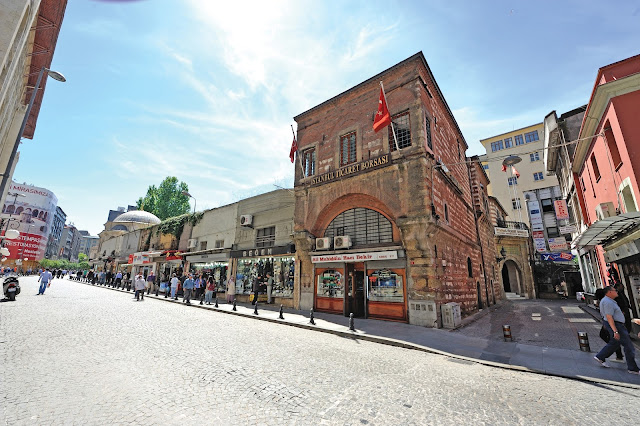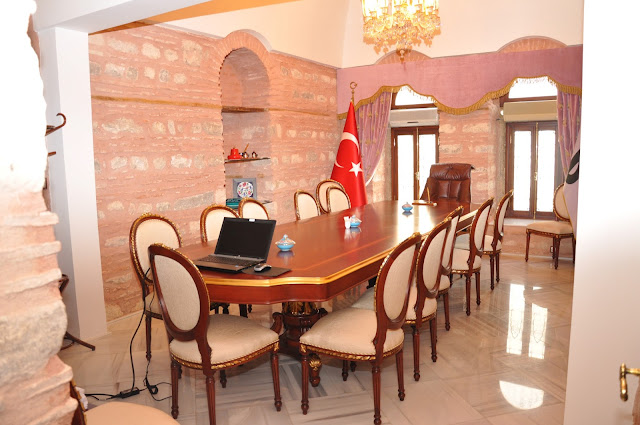Istanbul Commodity Exchange President Ali Kopuz:
“The E-Market will be a turning point for the exchange business”
Istanbul Commodity Exchange (İSTİB) is one of the oldest commodity exchanges in Turkey; it is also the largest, based on number of members and transaction volume.
Istanbul Commodity Exchange is aiming to carry exchange procedures into the 21st century with its 'Istanbul Commodity Exchange Electronic Market Project' by making available traditional exchange procedures on a digital platform.
Istanbul Commodity Exchange has been the largest exchange in Turkey since its foundation on 19 October 1924. It keeps working on registration of commodities and also the detection and declaration of prices of those commodities included in the market.
In the new era, the Exchange is making an effort to contribute to the agriculture, food and livestock sectors to develop and to increase the competitive environment while considering national and global dynamics.
 |
| Istanbul Commodity Exchange President Ali Kopuz |
Regarding these efforts Istanbul Commodity Exchange produces numerous publications and provides help for fair attendance and training programs. President Ali Kopuz defines these as 'member oriented activities.'
"First we thought about what we can do to improve competitive capacity and the quality of product and service of the Exchange members. Then we asked the same questions of them.
"We determined a three step development strategy with our own inquiries, along with the help of suggestions from our members. I can summarise this strategy as continuous education, continuous product and service progress and continuous search for new markets."
President Kopuz states that they are developing different projects for each of these steps and they have already begun to apply some of them.
The Academy
Ali Kopuz emphasises that information is the most important element that affects competition in the age of information and because of that, they located education and training at the core of their strategies.
He says, "We are using our website as a tool to help our members to easily access the data they need. We’re translating and publishing all the reports and statistics that may concern them."
Along with data publications on its website, Istanbul Commodity Exchange conducts training activities. These training sessions are organised periodically to improve the knowledge of our members on specific subjects.
Ali Kopuz also says that they made these activities more institutional by conducting these “continuous training activities under the roof of the newly founded 'Istanbul Commodity Exchange Academy'."
He says, “We began to conduct training sessions which cover a broad range of topics from institutionalisation to branding, from marketing strategies to how to raise quality.”
Continuous product and service improvement
Istanbul Commodity Exchange works to improve the quality of the products and services of its members.
President Kopuz says, "Quality is a term that everyone talks about, but rarely understands the true meaning behind it. This doesn’t diminish its importance. On the contrary, it enhances it. Whoever understands the depth of the term and acts accordingly, takes the advantage. These changes have begun with the improvement of the service quality of Istanbul Commodity Exchange in the new era."
According to Istanbul Commodity Exchange, improvement of products and services is an endless effort. With this thought in mind, Istanbul Commodity Exchange also shows sensitivity towards lost values. In the Istanbul Commodity Exchange Laboratory, organic seeds at least 50 years old have been reproduced by work conducted with the cooperation of the Ministry of Agriculture and Yeditepe University. Right now, they’re working on the genome map of the seeds.
New markets
The board of the Istanbul Commodity Exchange believes that members shouldn’t be restricting themselves and they should think globally, and because of this motto, they’re trying to help the members to 'Aim for the World' regarding new market searches.
President Ali Kopuz underlines that there has never been an era in which capital, commodity and service became this global: “We have to adjust ourselves to this new world.”
He says: “Our members must target the global market. With this thought in mind, we are working to take them to the international markets. We are subsidising by making them benefit from various supports for national and international fairs. We took a lot of our members to the fairs. We intend to keep working harder on this.”
Turning point: E-market
President Kopuz is putting the 'Electronic Market Project' at the intersection of all their work. He says that technological advancements have changed the term 'place' and he believes Exchange business will transform with the electronic market project which will operate online. With this project, they will make the most crucial elements of exchange transactions available online.
He notes that: “First of all, the Electronic Market Project will improve the selling abilities of our members, so they’ll be able to access much larger markets. They’ll be able to do things like purchase and sale, payment, collection, exchange registration, exchange fee and transaction steps in a fast and secure way.”
With the Electronic Market Project, producing of reference spot prices and acquiring of the necessary spot data for the futures Exchange will be much easier.
Ali Kopuz says that “This way, we will help the Istanbul International Financial Centre to achieve its goal of being a place where the future market for agricultural commodities in particular and other raw materials are determined."
İSTİB in figures
Members: 10,986
Eminönü Administrative Building
New markets
The board of the Istanbul Commodity Exchange believes that members shouldn’t be restricting themselves and they should think globally, and because of this motto, they’re trying to help the members to 'Aim for the World' regarding new market searches.
President Ali Kopuz underlines that there has never been an era in which capital, commodity and service became this global: “We have to adjust ourselves to this new world.”
He says: “Our members must target the global market. With this thought in mind, we are working to take them to the international markets. We are subsidising by making them benefit from various supports for national and international fairs. We took a lot of our members to the fairs. We intend to keep working harder on this.”
Turning point: E-market
President Kopuz is putting the 'Electronic Market Project' at the intersection of all their work. He says that technological advancements have changed the term 'place' and he believes Exchange business will transform with the electronic market project which will operate online. With this project, they will make the most crucial elements of exchange transactions available online.
He notes that: “First of all, the Electronic Market Project will improve the selling abilities of our members, so they’ll be able to access much larger markets. They’ll be able to do things like purchase and sale, payment, collection, exchange registration, exchange fee and transaction steps in a fast and secure way.”
With the Electronic Market Project, producing of reference spot prices and acquiring of the necessary spot data for the futures Exchange will be much easier.
Ali Kopuz says that “This way, we will help the Istanbul International Financial Centre to achieve its goal of being a place where the future market for agricultural commodities in particular and other raw materials are determined."
İSTİB in figures
Members: 10,986
Eminönü Administrative Building
- Area: 2200 Square meters
- Employees: 94
- Administrative Building, 2014 Transaction Volume: 17,575,887,056.40 TL (5,982,873,355.48 USD)
- Area: Total 140,000 square metres; closed area 25,680 square metres
- Employees: 19
- Capacity: 15 thousand sheep, 1500 cows
- Livestock Exchange 2014 Transaction Volume: 2,849,452,340.37 TL (969,960,288.79 USD)
- Bread Wheat (1,562,748.55 tons),
- Soybean (1,119,152.94 tons),
- Soybean Pulp (784,244.24 tons),
- Maize (644,802.16 tons),
- Wheat Flour (503,724.24 tons),
- Natural Eggs (469,608,756 piece),
- Sunflower Pulp (304,232.50 tons),
- Winterised Sunflower Oil (282,192.05 tons),
- Potatoes (276,426.88 tons),
- Industrialised N. Margarine (200,224.48 tons)
- 2014 Total Trading Size: 20,425,339,396.77 TL (6,952,833,644.27 USD)
- Rami
- Mega Center
- Kadıköy
Visit the Istanbul Commodity Exchange site HERE.
The Global Miller
This blog is maintained by The Global Miller staff and is supported by the magazine GFMT
which is published by Perendale Publishers Limited.
For additional daily news from milling around the world: global-milling.com







No comments:
Post a Comment